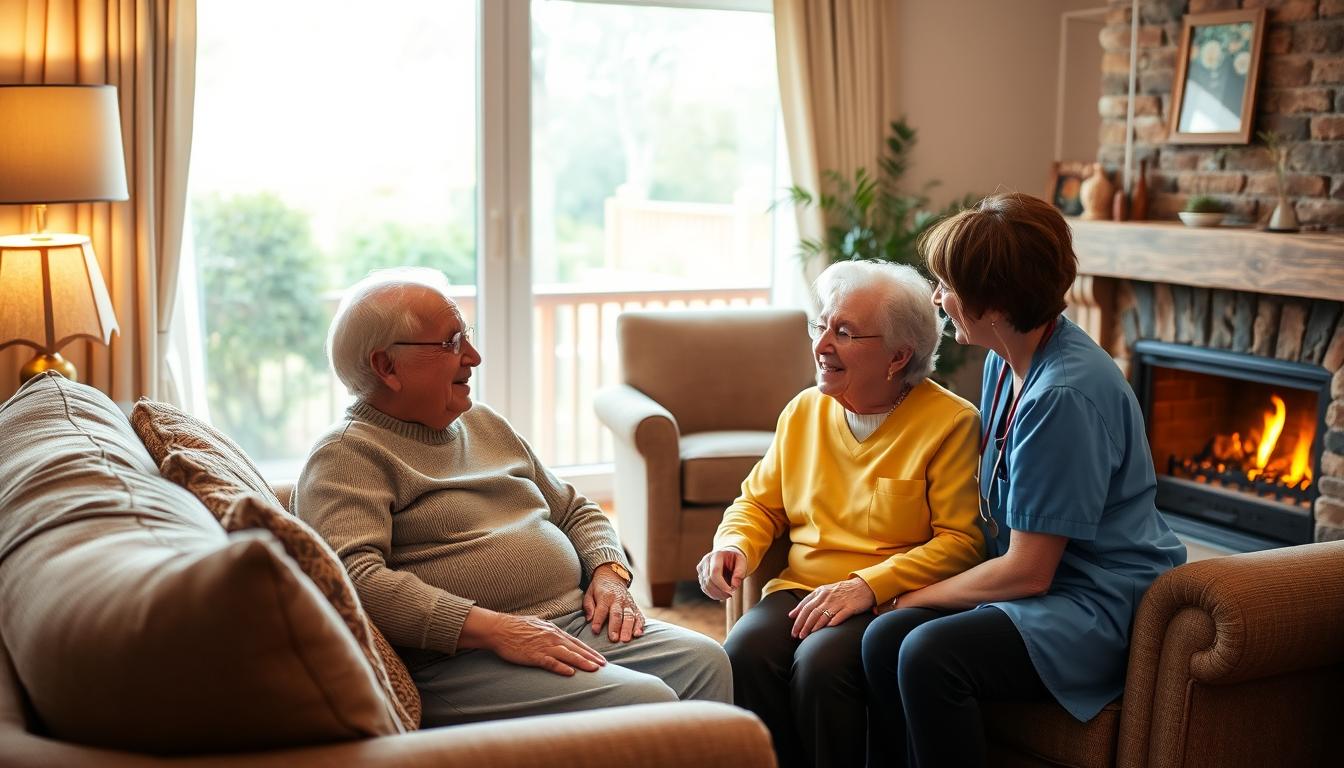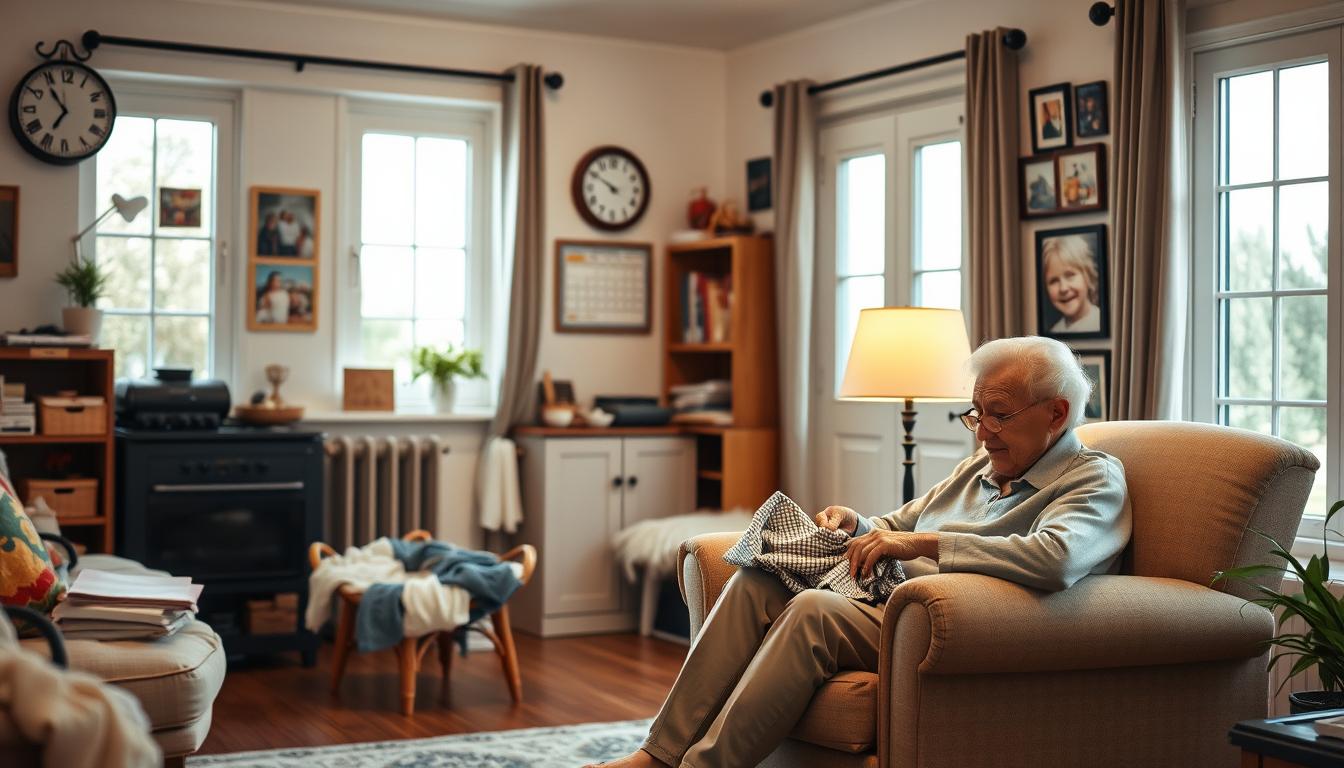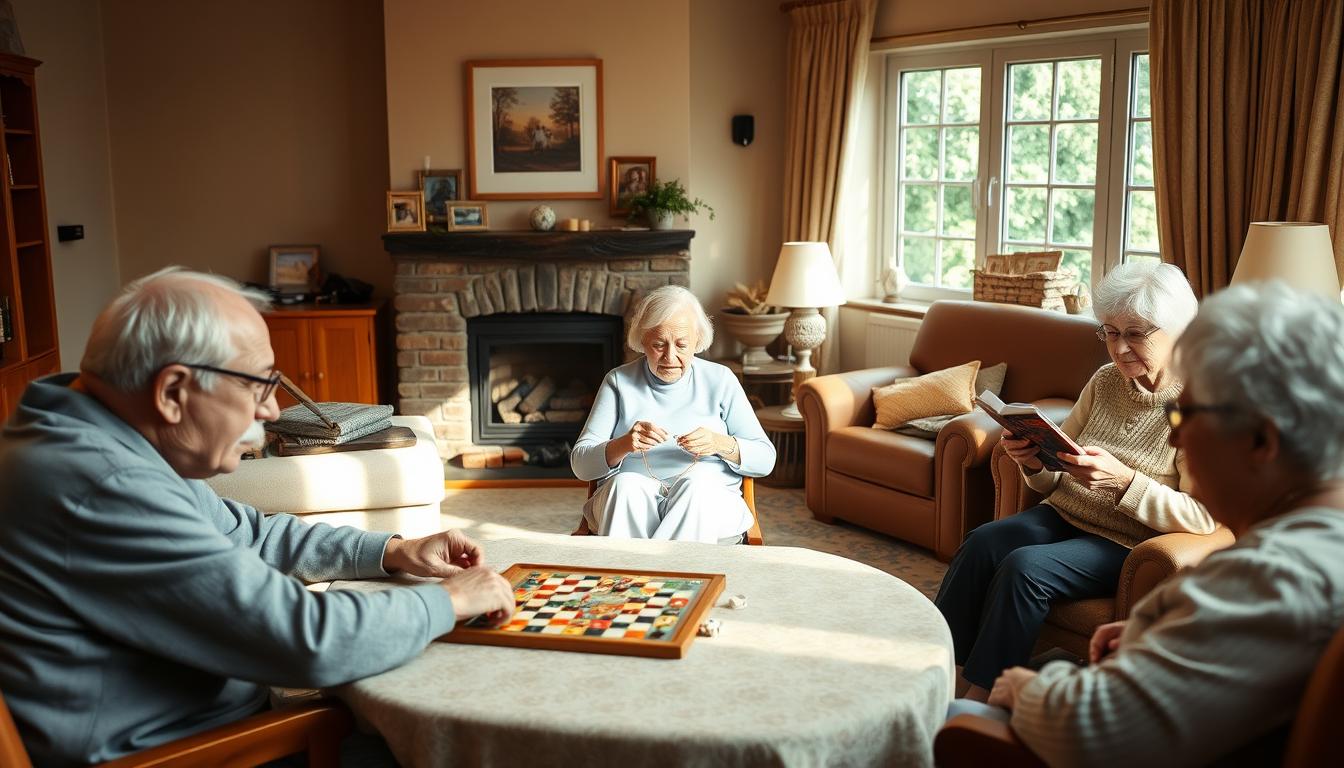How Can Companion Care Foster Independence for Seniors?
May
31
2025
As you or your loved ones get older, staying independent is key for happiness and health. Senior companion in-home care is a personalized way to keep older adults at home. It gives them the support they need while empowering them to live in their own space.
This personal care focuses on emotional support, social interaction, and help with daily tasks. It lets seniors age with grace and dignity while helping maintain their way of life.
Companion care tackles the big challenges of aging like feeling lonely and struggling with daily tasks. It offers companionship, meaningful talks, and help with simple chores or cooking. This home care helps seniors stay independent, boosts their happiness, helps maintain cognitive health, and quality of life.
With a focus on personal attention and building real connections, the benefits of companion care can change an older adult’s life. It makes a big difference in their happiness and well-being.
Key Takeaways
- Companion care helps seniors maintain independence through personalized in-home support
- Emotional support and social engagement are key components of senior companion care
- Assistance with daily tasks and errands enables seniors to age in place comfortably
- Companion care improves overall quality of life by addressing loneliness and isolation
- Personalized attention and genuine connections are at the heart of effective companion care
The Importance of Independence for Seniors
Mobility and support with daily tasks are keys for allowing seniors to maintain their independence and comfort as they age. It affects their physical health and emotional well-being. Many seniors cherish their freedom and the right to make their own choices.
Feeling in charge of their daily lives boosts their dignity and self-worth. This feeling is vital for their happiness. This is where elder care through a personalized care companion really shines.
Physical and Emotional Well-being
Independence is vital for seniors’ physical health. It lets them move freely and do things they love. This keeps them mobile and strong.
It also gives them a sense of purpose. This reduces the chance of depression or anxiousness.
Maintaining Dignity and Self-worth
For many seniors, keeping their independence is about dignity and self-worth. They want to take care of themselves and make their own choices. This makes them feel proud and accomplished.
Feeling valued and respected is essential for their emotional health. It improves their overall quality of life.
But, as seniors get older, they might face challenges. This is where companion care helps. It offers the support they need to stay independent.
A good senior care plan focuses on keeping them independent by helping with daily tasks that may cause risks to the person, provides benefits of socialization, and increases cognitive function. It ensures their safety and well-being. This brings peace of mind to seniors and their loved ones, knowing their needs are met with care and respect.
Challenges Seniors Face in Maintaining Independence

As we age, it gets harder to stay independent. Seniors often struggle with physical issues, memory loss, and feeling lonely. Companion care services help by addressing these problems and providing support.
One big challenge is mobility issues. Older bodies are less agile and more prone to injuries. This makes simple tasks like cooking and cleaning hard and risky for seniors living alone. Home care services, including companion care, help with these tasks. In addition, the right plan of care should incorporate exercises based on the capabilities of the individual for maintaining strength and muscle tone. This way, seniors can stay independent and safe.
Cognitive Decline
Many seniors also face memory and thinking problems. Our minds aren’t as sharp as they used to be. This makes remembering things and making decisions harder. Companion care for seniors offers the support and guidance needed to keep their minds sharp and independent by incorporating cognitive stimulation activities.
Social Isolation and Loneliness
Another big challenge is feeling lonely and isolated. As we age, we might lose loved ones or move away from friends and family. This can lead to serious health problems. Companion care services help by providing social interaction and activities that seniors enjoy. This helps them feel connected and gives them a sense of purpose.
The table below highlights some of the key challenges seniors face in maintaining independence and how companion care can help address them:
| Challenge | Impact on Independence | How Companion Care Helps |
| Mobility Limitations | Difficulty with everyday tasks and increased risk of injury | Assists with activities of daily living to ensure safety; incorporate exercising |
| Cognitive Decline | Difficulty making decisions and remembering important information | Provides support and guidance to maintain cognitive health |
| Social Isolation and Loneliness | Negative effects on mental and physical health | Provides regular social interaction and engagement in enjoyable activities |
Understanding the challenges seniors face and the care options available helps families support their loved ones. Companion care services are a valuable solution for seniors wanting to stay independent while getting the support they need.
What are Companion Care Services?

Companion care is a type of support for seniors to live at home. It helps them stay independent and enjoy life. This care focuses on companionship, emotional support, and daily tasks.
It’s different from more intense care like skilled nursing. Companion caregivers build strong bonds with seniors. They do activities, talk, helping to fight loneliness.
Companion care providers offer services based on each senior’s needs. They might help with:
- Meal planning and preparation
- Light housekeeping and laundry
- Transportation to appointments and social events
- Medication reminders
- Engaging in hobbies and activities
- Providing a listening ear, emotional and physical support
This support keeps seniors independent and dignified. It lets them live at home with the help they need. Companion care is all about making seniors’ lives better.
Benefits of Companion Care for Senior Independence
Companion care helps seniors keep their independence and dignity. It offers personalized care plans that meet their unique needs. Home care agencies provide many benefits that improve seniors’ lives and make them feel comfortable and help maintain a quality of life while minimizing risks.
Providing Emotional Support and Companionship
Companion care is great for seniors because it offers emotional support and companionship. It helps fight loneliness, isolation and depression, common issues for older adults. Caregivers listen, engage in fun activities, and help seniors feel connected and valued.
Assisting with Daily Tasks and Errands
Companion care also helps with daily tasks and errands. This lets seniors stay independent and manage their homes better. Caregivers can help with things like:
- Meal planning and preparation
- Light housekeeping and laundry
- Grocery shopping and running errands
- Transportation to appointments and social events
This support lets seniors enjoy their favorite activities while their basic needs are taken care of.
Encouraging Social Engagement and Activities
For seniors, staying social and active is key to their well-being. Companion care encourages them to do things they love. Caregivers can take them to:
| Activity | Benefits |
| Senior center programs | Socialization, skill-building, and community involvement |
| Fitness classes | Physical health, mobility, and strength |
| Cultural events | Intellectual stimulation and enrichment |
| Volunteer opportunities | Sense of purpose and contribution to society |
By supporting seniors in their activities, companion care boosts their independence, self-worth, and happiness.
How Companion Caregivers Foster Independence with Home Care
Companion care lets seniors live on their own at home and on their own schedule. It offers help with daily tasks, making life better for older adults. This care helps them stay independent as they get older.
Enabling Seniors to Age in Place
Companion care helps seniors stay in their homes. Home is where they are comfortable, familiar and have many memories; a place they know well. Caregivers make homes safe and easy to get around, keeping seniors comfortable and safe.
Customized Care Plans to Meet Individual Needs
Working with the senior and their family, a Companion care plan is developed specifically for each person. These plans help with things like meals, medication reminders, and a supportive role.
Collaboration with Family Members and Healthcare Providers
Good companion care means working together. Caregivers, families, and doctors talk to each other to help seniors. They share important information about a senior’s life and health, helping everyone make the best care choices.
Choosing the Right Personalized Care Provider
When looking for a way to help seniors stay independent, picking the right care provider is key. Spend time researching and comparing different options. This ensures they offer the care and support your loved one needs.
Search for a provider that specializes in supporting senior independence. They should understand and meet the emotional needs of seniors. Look for one with a history of creating personalized care plans that fit each senior’s unique needs and goals. Look at on-line reviews and verify credentials.
Qualifications and Training
Make sure the care provider has qualified and trained caregivers. They should have the skills to provide top-notch care to seniors living alone. Some important qualifications include:
- Certification in senior care or a related field
- Experience working with seniors and understanding their unique needs
- Training in areas such as fall prevention, the ability to monitor changes in physical and cognitive condition, and dementia care
- First aid and CPR certification
Personality and Compatibility
The caregiver’s personality and how well they match with the senior are also critical. Seniors who live alone need a caregiver they can trust and feel comfortable with.
- Are they compassionate, patient, and understanding?
- Do they have a warm and friendly demeanor?
- Can they engage in meaningful conversations and activities with your loved one?
- Are they respectful of your loved one’s preferences, routines, and boundaries?
The true power of companion care is in providing both physical and emotional support. By choosing a provider that values both qualifications and compatibility, you ensure your loved one gets the care they need. This helps them stay independent and enjoy a good quality of life.
Conclusion – Help Seniors Maintain Independence with Personal Care
Companion care is key in keeping seniors independent and happy. It offers emotional support and helps with daily tasks. This way, seniors can stay in their own homes and live comfortably.
Choosing the right caregiver is important. They create care plans that meet the senior’s needs and preferences. This ensures seniors get the support they need to stay at home with dignity.
Companion care helps seniors stay independent and enjoy life. It makes them feel connected to their families and communities. If you’re looking for care, find someone who understands and supports your loved one’s needs like You’re First Home Care in Houston.
FAQ – Empower Seniors Quality of Life with Tailored Care
What is personalized companion care, and how does it differ from other types of senior care options?
Companion care is a type of care that focuses on emotional support and daily activities for seniors. It’s different from other care because it aims to improve quality of life. It offers personalized, non-medical services.
Why is maintaining independence important for seniors?
Keeping independence is key for seniors’ well-being. It boosts their quality of life and dignity. It also helps their mental health by giving them control over their lives.
What challenges do seniors face in maintaining their independence?
Seniors struggle with physical and cognitive issues, and social isolation. These challenges make it hard to stay independent. Loneliness, mobility issues, and safety concerns add to the difficulty.
How does companion care help seniors remain independent?
Companion care helps seniors stay at home by creating a safe space. It offers a care plan that fits their needs and preferences. Caregivers work with families and healthcare to support seniors’ daily activities.
What benefits does companion care offer for seniors?
Companion care reduces loneliness and boosts confidence. It encourages healthy habits and provides emotional support. It also gives families peace of mind, knowing their loved ones are cared for.
What should I consider when choosing a companion care provider?
Look for a provider with qualified, caring caregivers. They should be experienced and match your loved one’s personality. Make sure they offer personalized care plans that meet your loved one’s needs.
How can I ensure my loved one receives the highest quality of care?
Choose a reputable provider with skilled caregivers. Ensure the care plan fits your loved one’s needs. Keep in touch with the caregiver to address any concerns or changes.
When is it time to look for companion care?
- When your loved one stops participating in activities they’ve loved to do in the past
- Daily chores are not getting done or piling up
- They seem depressed (maybe they start calling you more or they stop calling you), become isolated from friends, neighbors or family
- They have trouble with daily activities or need help with appointments/transportation
- A major change in their life like the loss of their partner/spouse
- Not remembering to take their medications, not bathing regularly (wearing the same clothes for days), or not eating well
Reach Out






